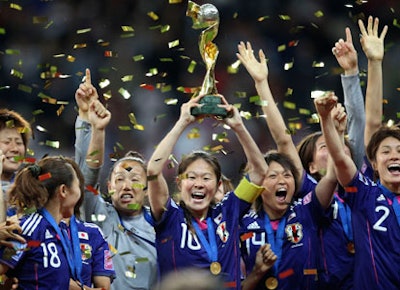Leave it to Bryant Gumbel to clearly articulate what is wrong with women's sports, men's sports and the sports media that covers mostly the latter.
In case you missed it, Gumbel closed his Real Sports show on HBO Sports last week with some challenging words for his profession in the wake of the Americans' defeat in the Women's World Cup final against Japan. "Can we stop coddling women in sports? Are we now so fearful of being labeled sexist that we can't objectively assess the efforts of female athletes?" Gumbel asked. "Had a men's team turned in a similar performance, papers and pundits nationwide would have had a field day assailing the players, criticizing the coach and demanding widespread changes to a men's national team that flat-out choked. Yet the common reactions to this ladies' loss were simply expressions of empathy for the defeat of the unfortunate darlings and pride in their oh-so-heroic effort."
I say, let's coddle the men, too.
Gumbel's right about the way the women's team was celebrated after the fact, and he's right about the way the men would have been savaged after the fact. What I want to know is, why is savagery called for at all?
Even my kids understand that sometimes, the other team wins. It just happens. My son's a keeper on a U-11 team. Last season during group play of a tournament, his team controlled the ball virtually the entire game on a blustery day, taking shot after shot that were either saved, just missed or hit the woodwork. But their opponents' keeper twice kicked the ball far downfield with the wind behind him, and the other team beat my son one-on-one, the latter score winning the game 2-1 in the closing minute.
He did his best to stop them. His teammates did their best to prevent the counterattacks. They failed. They lost.
Did the United States' women flat-out choke? By the common definition accepted by the (male) blowhards that dominate sports reporting, yes. The women twice took the lead only to have Japan equalize off defensive errors and using their own attacking skills, and then they lost in a penalty shootout by taking poor penalty shots. As happens to many soccer teams that lose a lead late, they appeared deflated, caught short, most of them probably having thought the game was won before Japan, as shockingly as the U.S. managed to do against Brazil in their stunning quarterfinal reversal, drew even in the dying minutes.
Let's play, "What if?" What if the defensive errors occurred in the first 40 minutes rather than the last 40? What if the score stood at 2-2 at halftime, and then the Americans peppered the Japanese keeper with shots, pounding ball after ball off the woodwork but not quite managing to get the third goal? What if, exhausted after 120 minutes of play, the U.S. women then lost in the shootout in the exact same fashion? Would it be accurate to call them chokers?
 japan-win-womens-world-cup-2011-07-18_l.jpg
japan-win-womens-world-cup-2011-07-18_l.jpg
Why is it acceptable, required even, to call professional athletes chokers? Is it because guys like Bryant Gumbel are frustrated wannabe athletes who sit on their expanding rear ends watching people who can do things that they in their wildest dreams could never do, and make millions of dollars doing it? (I'm talking about male athletes here. The women mostly go home and work regular jobs and take care of their families, unless they look like a fashion model.)
The U.S. women lost. Sometimes, the other team wins. Sometimes the other team gets the breaks, runs harder, plays more inspired. This shouldn't give commentators license to eviscerate the athletes or the coaches, questioning their talent, their desire, their smarts, their "heart" or their "guts."
Yes, there's a double standard. Commentators did back off the women after their gut-wrenching loss. I say, good for them. It seems like the world took a deep breath, understood it was just a game, and moved on.
You want to know what the real double standard was during the Women's World Cup? After the Brazil game, there was hardly an American sports columnist or commentator who didn't declare that the 122nd-minute tying goal by Abby Wambach was proof that the character of the United States team, and Americans in general, was somehow exalted, a cut above the rest of the world's. Americans never give up. Americans have a can-do attitude that is unparalleled. Americans are unmatched at overcoming adversity.
Japan won, overcoming more adversity than the U.S. team did, with a can-do attitude that was unmatched. So, we were supposed to rip the Americans afterward? What on earth for?
































